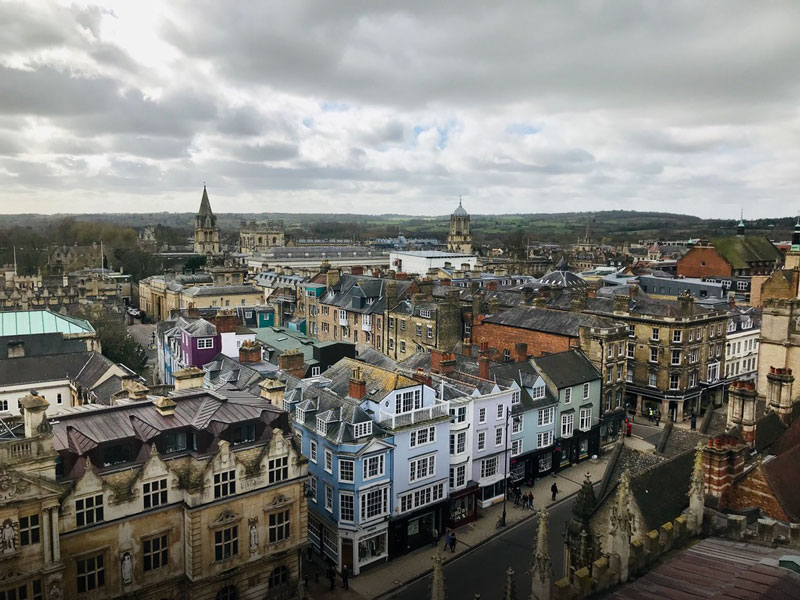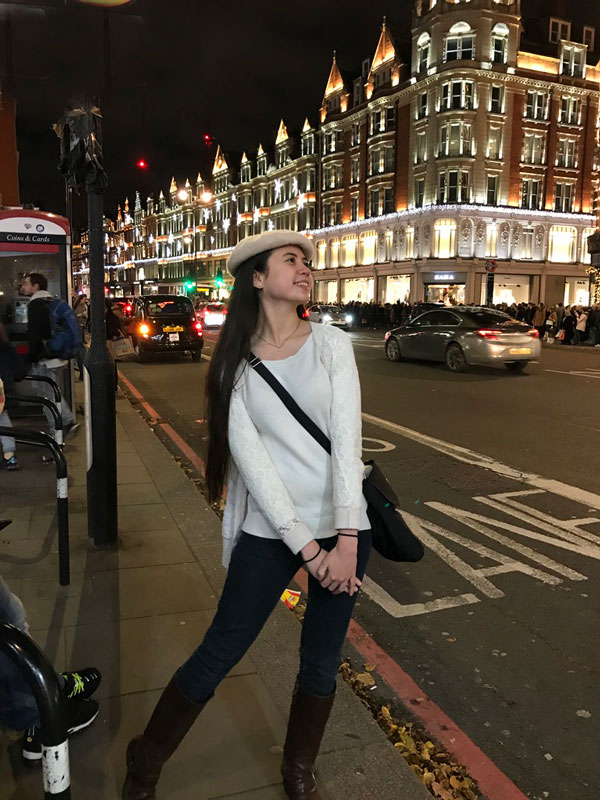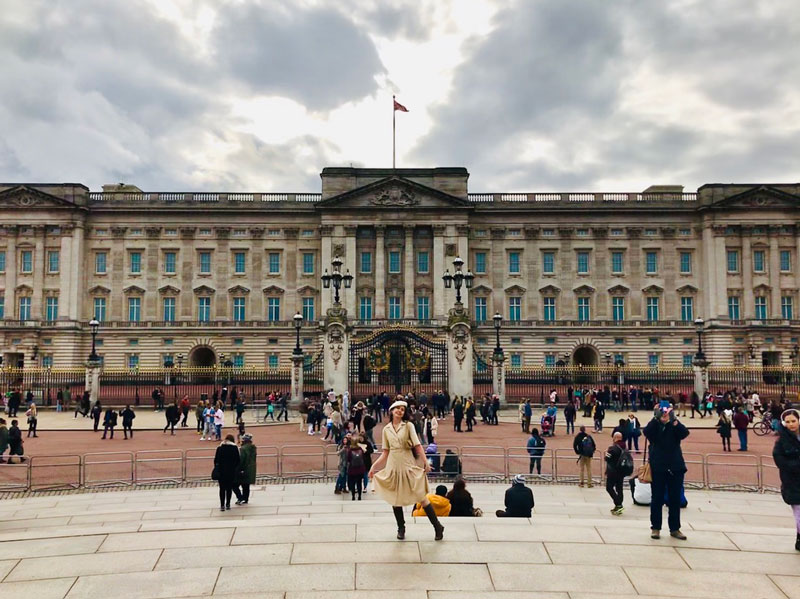At Home Among the Spires
Story by Rachel McCarthy ’21
As Illinois Wesleyan celebrates the 25th anniversary of its association with the Pembroke Program and the University of Oxford, Rachel McCarthy ’21 shares a firsthand account of her experience studying in the “City of Dreaming Spires.”

I thought they were kidding about the tailcoats.
It was a dark and stormy night as I stepped off the coach bus from London Heathrow airport, the plastic of my suitcase wheels rattling against centuries-old cobblestone. As I blinked away the rain and scanned the fortress-like walls in front of me for anything resembling an address, I saw a group of people walking down the street, laughing and talking loudly like college students do, except the college students I knew didn’t dress like they had just come from a 19th-century dinner party. I shrank into the wall, my purple hoodie sticking out like a sore thumb, and let them pass me by, coattails fluttering in the wind. The bus rolled away, and as anxiety gnawed at my stomach, I briefly wondered if it was too late to have the bus take me home.
Of course, home for me lay across the Atlantic, back at Illinois Wesleyan University. It was there that Professor and Chair of English Joanne Diaz had first floated the idea of studying English for a year at Pembroke College, one of the 39 independent colleges which comprise the University of Oxford. The Pembroke Program was highly selective — only 13 institutions in the United States have this special partnership with Pembroke, including Ivy Leagues like Harvard, Columbia and Cornell — but Professor Diaz believed in me and encouraged me to apply. I met the 3.7 GPA requirement, and I had some solid writing samples from English classes I had taken with her. So, I spent that winter break working on my application, and once I had submitted it, I didn’t let my mind dwell.
“I’m not worried about it,” I explained to my mom. “I know it’s competitive, so I won’t be disappointed if I don’t get it. The only way I would be disappointed is if I didn’t try at all.”
My mother, who immigrated from the Philippines after graduating from college, never let me forget the importance of education. I kept a photo of her on the desk in my room at Oxford, situated at the top of a small white building overlooking the freshly manicured quad — a literal ivory tower. As I went through orientation week, settling in with each passing day, I wondered if this was how it felt for her to move across the world in pursuit of educational opportunities, an endeavor which culminated in sending her daughter to one of the most prestigious universities in the world. Four thousand miles between us, and yet I had never felt closer to her.

Oxford has maintained its prestigious reputation in part due to its unique tutorial system, in which students spend most of their time in independent study, guided by a handful of faculty members, or “tutors.” Students meet with their tutors every week, either individually or in small groups, to present their papers, argue their points, and engage in deep discussion about the weekly topic. Sessions are intense, nerve-wracking, but also exhilarating, a rare privilege to marvel at some of the greatest minds in action. To prepare for these tutorial sessions requires hours of research, working through assigned reading lists, taking notes, synthesizing an argument, and of course, writing the actual paper. Aside from a handful of lectures and class activities, the only schedules are the ones that students make for themselves.
“First paper due Tuesday,” I wrote in the calendar of my planner, which used to hold hour-by-hour classes and meetings, before leaving it to collect dust at the bottom of my desk.
As a result, time at Oxford can feel completely separate from the rest of the world. In conversations with classmates, the eight weeks of Oxford’s three terms replaced months of the year. Thursday afternoons became my weekends, when I would treat myself to boba tea at my favorite cafe after finishing my last tutorial session of the week. My sleep schedule became much more flexible, shifting to accommodate my night owl work habits or my morning runs along mist-shrouded rivers. If llinois Wesleyan taught me how to balance 20 different tasks each day, Oxford taught me how to hyper focus on one, whether it was reading 11th century manuscripts or analyzing the language of 21st century advertisements. Large swaths of my days were spent at Bodleian Library, home to some 13 million books and print materials, with paintings of scholars and artisans watching over from the rafters.
“It’s like being in the library from Harry Potter,” I told my friends back home. “No, really, it’s the actual set … and the Great Hall is just across the street.”
After a day of walking through a city of miniature Hogwarts Castles, calls with friends and family were what kept me grounded. Homesickness was tough, but I fought back by finding pieces of home among Oxford’s ancient brick and mortar. I joined a K-pop dance club at a nearby college to temporarily replace the team I had left behind at Illinois Wesleyan, discovered a food truck that sold classic Filipino meals like the ones I ate at home, and recreated holidays like Thanksgiving and Super Bowl Sunday with the help of American and British friends alike.
Thanks to IWU’s strong commitment to providing study abroad opportunities, I also had friends scattered across Europe during my time at Oxford. On Halloween weekend we congregated in Stockholm, where we did everything from visiting the Royal Palace to riding roller coasters at a Halloween-themed amusement park. Winter break brought us to Belgrade, Serbia, filled with beautiful museums and stunning Orthodox churches. For spring break, we agreed that it would be my turn to host, and I began making a list of the places in Oxford that had become my home. Along with plans for high tea at The Grande Cafe and a photo shoot at the famous Bridge of Sighs were notes to go thrift shopping at my favorite open-air market and visit the cows that roam the meadows behind Christ Church College — a piece of the Midwest hidden in the heart of Oxfordshire.
Soon, however, another piece of the Midwest came in the form of a one-way plane ticket to O’Hare International Airport.

I was about to go to sleep after drafting the final paper of my second term when my American group chat lit up with news of the Europe travel ban amid the early global outbreak of COVID-19. The ban didn’t include the U.K. or Ireland, but other American students had been pulled from Oxford a few days before, and we couldn’t help but speculate what would become of us. The following Thursday was spent anxiously awaiting updates from our home institutions, followed by a steady trickle of status updates: “I’m staying,” “I haven’t heard back,” “I have to go home.” IWU reached out to me on Friday morning, and 48 hours later I was boarding a coach bus to Heathrow.
As the bus rolled away, I thought back to that first night at Oxford, and that feeling of being way out of my depth. How self-conscious I was about my Midwestern y’alls, my non-Ivy League university, and my obvious lack of tailcoat-money. But Oxford is so much more than fancy dinners and rowing matches; it’s filled with people who are warm, down-to-earth and wildly passionate about the things they’re studying. People who told me to never hide my accent, who liked hearing where I came from, and who made me feel a sense of belonging at a school so unlike my own.
Now, I realize that I belonged there because Illinois Wesleyan belongs there — a small, hidden gem that’s on par with the big names. In the 25 years since the Pembroke Program began, IWU has made its home within the walls of Pembroke College, and with any luck, it will continue to do so for many years to come.
About the Author: Rachel McCarthy ’21 earned a bachelor’s degree from Illinois Wesleyan, as a double major in English-literature and psychology, in 2021.